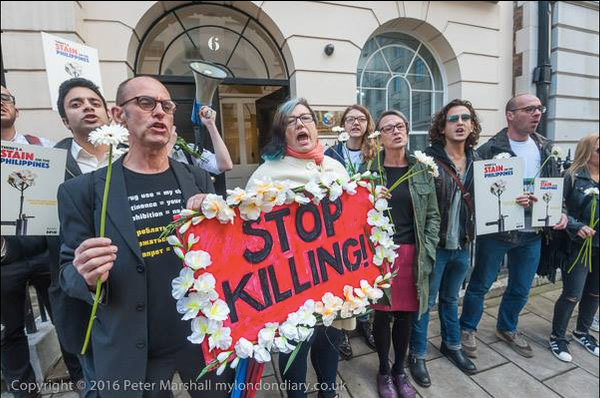Activists around the world protest state-sanctioned murder of more than 3,000 people who use drugs in the Philippines
By Hannah Hetzer
Yesterday, dozens of activists gathered in front of the Philippines Consulate in NY to protest the recent brutal murders of people suspected to be involved in drug use or selling in the Philippines, and listened in silence as a long list of names of those who have been killed was read out. The names represent individual lost lives, and they are only a fraction of those who have been killed to date in President Duterte’s bloody war.
Upon assuming presidency of the Philippines in May, Rodrigo Duterte made a public call for police and citizens alike to execute people who use or sell drugs, telling Filipinos to “feel free to call us, the police, or do it yourself if you have the gun," and pledged to protect the killers from prosecution. Recently, President Duterte compared himself to Hitler, vowing to kill millions of drug users. Since making these harrowing calls to action, over 3,600 people suspected to have been involved with drugs have been murdered. A further 700,000 people who use drugs have turned themselves in to authorities – undoubtedly out of fear for their lives – and who will now face time in overcrowded prisons and likely be subjected to inhumane and involuntary drug treatment programs.
The protest in NY was part of a Global Week of Action to Stop the Killings in the Philippines. This week, in events taking place in cities across the world, activists are gathering to express their grief and outrage, and are presenting a letter to their local Filipino embassies and consulates. The letter, written by the Asian Network of People who Use Drugs and the International Network of People who Use Drugs implores President Duterte “to immediately call for an end to the extrajudicial murder of people who use drugs and instead focus on internationally accepted, evidence-based interventions and policies that place the reduction of harm and the wellbeing of the community front and centre.”
Click here to read the full article.
Keep up-to-date with drug policy developments by subscribing to the IDPC Monthly Alert.
Thumbnail: Copyright Peter Marshall 2016
Topics
Related Profiles
- Drug Policy Alliance (DPA)
- International Drug Policy Consortium (IDPC)
- International Network of People Who Use Drugs (INPUD)
